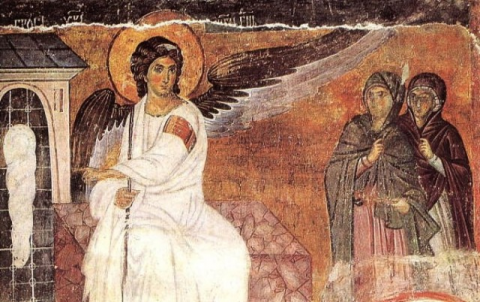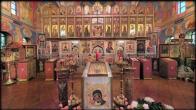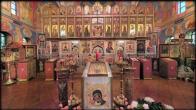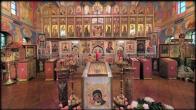You are here
SEEING

8th Gospel Reading (John 20: 11-18)
But Mary stood without at the sepulcher weeping: and as she wept, she stooped down, and looked into the sepulcher, and seeth two angels in white sitting, the one at the head, and the other at the feet, where the body of Jesus had lain. And they say unto her, Woman, why weepest thou? She saith unto them, because they have taken away my LORD, and I know not where they have laid him. And when she had thus said, she turned herself back, and saw Jesus standing, and knew not that it was Jesus. Jesus saith unto her, Woman, why weepest thou? Whom seekest thou? She, supposing him to be the gardener, saith unto him, Sir, if thou have borne him hence, tell me where thou hast laid him, and I will take him away. Jesus saith unto her, Mary. She turned herself, and saith unto him, Rabboni; which is to say, Master. Jesus saith unto her, Touch me not; for I am not yet ascended to my Father: but go to my brethren, and say unto them, I ascend unto my Father, and your Father; and to my God, and your God. Mary Magdalene came and told the disciples that she had seen the LORD, and that he had spoken these things unto her.
« They have taken away my Lord, and I know not where they have laid him», says Mary Magdalene, crying, and turning around sees Jesus standing there, but does not recognize him. «Woman, why weepest thou; whom seekest thou?» She, thinking Him to be the gardener, says to Him, «Sir, if thou have borne him hence, tell me where thou hast laid him, and I will take him away.» «Maria» says Jesus to her.
The Lord said «Maria,» and after a single word, Mary recognized Him. It was difficult for a person to recognize Christ after His Resurrection, and in His new, transfigured flesh. Let us remember the Apostles' fruitless attempts at fishing during the night, how at dawn they saw a person on the shore, who began speaking with those in the boat, asking about food, and how the Apostles did not recognize the Lord. It was only after they pulled up the net they had cast at his direction, and found it miraculously filled with a multitude of fish, that the young visionary, the eagle-eyed John said to Peter, «It is the Lord.» And when Luke and Cleopas were on their way to Emmaus, and the Lord caught up to and walked alongside them, to Emmaus itself, talking with them of prophecy, and they, the Apostles, did not recognize the Lord; they had to experience the eucharistic breaking of Bread before recognizing God become Man, and Resurrected human nature. It was difficult to peer with their old, sinful, eyes at the transfigured, resurrected, and already ascending body of Christ. It was too great a Mystery.
However, the Lord had to be recognized by the world after his Resurrection. In taking Thomas by the hand, he would take the whole word by the hand and thrust it into His true human flesh, which had been ravaged by people. The Lord had to be revealed to man after His Resurrection.
To whom did the Lord first show himself? To Mary Magdalene, that possessed Judean woman whom He had healed forever. She was looking for Him, and not only looking for Him, but weeping because she could not find Him. Do many people in this world weep for Christ? When Mary, moved by an unconscious awareness of Christ's presence, turned about and saw a gardener, asked him about what was causing her grief, what did this stranger say to Mary? He replied with but a single word: «Maria»... That word was enough to work the miracle of [making her] recognize the Lord. That word had as much power as did the breaking of bread in Emmaus. It even seemed to be somewhat greater, for the Lord did not fade away, but remained recognized, and instructed her to tell the Good News.
Whence came such power in that word? Why, after an extended conversation, did His closest disciples not recognize their Teacher, while Mary recognized him after hearing but a single word? Let us consider that simple word with which God, resurrected on earth, addressed the first person to meet Him. A simple word, but one that penetrates into the very depths of humanity, for it names someone. It is the greatest word, the word one finds most precious and miraculous, for it identifies the person, it is the human being's identity, an identity in the image and after the likeness of God. Our name is an expression of our essence. For each of us, it is our very existence. Oh, how do we value, even among those like us, an address to our soul, to that very most important thing within us. How do we rejoice in our souls when someone addresses our living soul. How precious to us is a simple friendly greeting by name. We sense especially acutely one who addresses our soul, our mystical world.
How much more perfectly, more brightly and burningly did the Creator Himself address His creation – the Lord Himself addressing Magdalene's human essence – when he said to her the single word, «Maria.» It was as if in that brief moment, the entire world had become embodied in that woman who was equal to the Apostles, and whose fate it was to have the first encounter with God glorified on earth. And the entire world heard the word addressed to that woman in the depths of her heart. The word came from the lips of the Lord, and man sensed that the word was said to him, to his unique name. And Mary immediately recognized the One Who had named her.
When addressed as «woman,» Mary had not recognized the Lord. The second time, the Lord addressed her already not as a woman who happened to be there, but as the unique person, Mary Magdalene, who no one else was or would ever be. And it was that revealed miracle of association in love between living God and a living person that opened Mary's eyes, and she saw Christ standing before her.
Believing in a living God, we also believe in living man, a precious, live, and unique individual, whose soul is more precious than the entire world.
PARISH LIFE
RECENT VIDEOS
Address of our Cathedral
Subscribe to our mailing list
While all the materials on this site are copyrighted, you may use them freely as long as you treat them
with respect and provide attribution on the Russian Orthodox Cathedral of St.John the Baptist of Washington DC.









